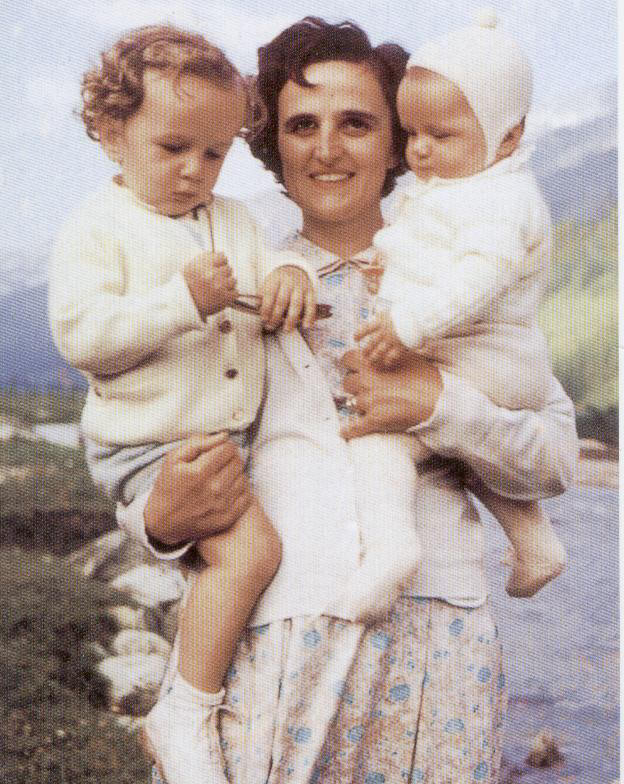
St. Gianna Molla
I don't know any culture that relishes pain in any way, shape or form other than a subculture of S&M. But that is ill. Normal folks avoid pain and relieves it ASAP; just watch the TV ads and tally how many are pills for tummy aches or head aches or muscles aches are being promoted. I would suspect that the epidemic of obesity and sexual addictions is tied to this. People are not as gluttonous or promiscuous as much they are hurting. And food becomes an acceptable source of comfort - hence the term "comfort foods". It is certainly more virtuous and socially acceptable than booze, dope or sexual abuse.
There is another way to deal to accept pain that is not in a form of sexual deviance. It can be seen as part of the strain and rigor to achieve physical stamina. "Feel the pain" the trainers say like it's a good thing. Well it is because it is the price to pay for muscle tone and a sexier bod. In social circles, pain can be used as initiation. Remember boot camp or a training program. Pain for the sake of pain gains a Stoic value - a virtue of the ancient Greco-Roman culture of conquest and supremacy where people don't flinch even when their arm is burned because they're just as tough as nails. That same thinking goes into gang, frat or military initiations.
But if your not out there earning your wings, shield or stripes, then how does pain make sense - specially in these days of unemployment or underemployment, of infidelities and ingratitude, of illness and old age. Christian spirituality looks at it as a source of purification and penance. Penance is like punishment for sins and purification is like cleaning from imperfections. One needs to be perfect to be united with God. So, these hard times can be ways and means to prepare for heaven. Otherwise, one will have to do it in Purgatory where one has really no choice but to wait it out until it over.
This is what St. John of the Cross talks about in his classic "The Dark Night of the Soul". Here there are no consolations or good feelings from loving God. It is just raw and rancid, bitter and vile as shown in the lives of almost all the saints when they were at their lowest point. Some had happy endings like St. John Bosco who found the Pinardi shed to become the oratory or playground for his homeless youth. Others lingered in this yucky state for the rest of their lives but remaining faithful to God all the time e.g. Blessed Teresa of Calcutta - quite possibly.
Most if not everyone goes through crappy times. It feels like God has left us such that we cry with the Lord hanging on the cross, "My God, my God why have you left me?" The difference is in the love. Saints feel like hell but they accept the pain with love as an expiation for their sins and for the sins of others. Those who are not yet saints resent the pain saying, "Why me? What have I done to deserve this?" Then they go to the 5 stages as mapped by Kubler-Ross - if they don't get stuck.
In the old school of virtues there are the advanced forms of humility namely: effacement and abnegation. Effacement means erasing your face. You don't care about the credit. You are not offended when others forget or ignore you. You have no face i.e. you no longer live, but Jesus lives in you. (Galatians 2:20) Then there is the humility of abnegation or deprecation where you see yourself for who you really are - a sinner, an imperfect selfish man, someone who spent his life for his own pleasure, greed, envy, avarice, power, praise, honors and the like. Someone who is not as loving as the incarnate Son of God. When one sees this and acknowledges it, then one accepts the bad things as just punishments and does so with love.
That is why saints are always cheerful. They feel joy in the midst of tribulations and sufferings because of this mindset. This is why the Lord taught that when we fast, we should not look glum. The same is when we're going through excruciating times. We need to embrace those times as moments of growth in holiness. Growth in holiness doesn't mean we're flying a little higher in the next level but it means loving truly i.e. loving even when it hurts. For the measure of love is love without measure and the limit of love is love without limits. Only when we have learned to love that way are we ready to join the family of God the Father, the Son and the Holy Spirit in their perfect communion of love.
So, feel and relish the pain as the best act of love that you can give. If you need a model, just glance at the nearest crucifix - if you don't carry one around.

Bl. Teresa of Culcatta

Bl. Teresa of Culcatta
2 comments:
I couldn't tell from your post: Are you saying following Kubler-Ross is good or bad?
Thanks
Kubler-Ross is a descriptive work and appears to be accurate hence good. What is bad is if a person gets stuck in one of the stages e.g. denial and never moves on to accepting the pain e.g. someone who denies the that her dead son is dead is mentally ill.
Post a Comment